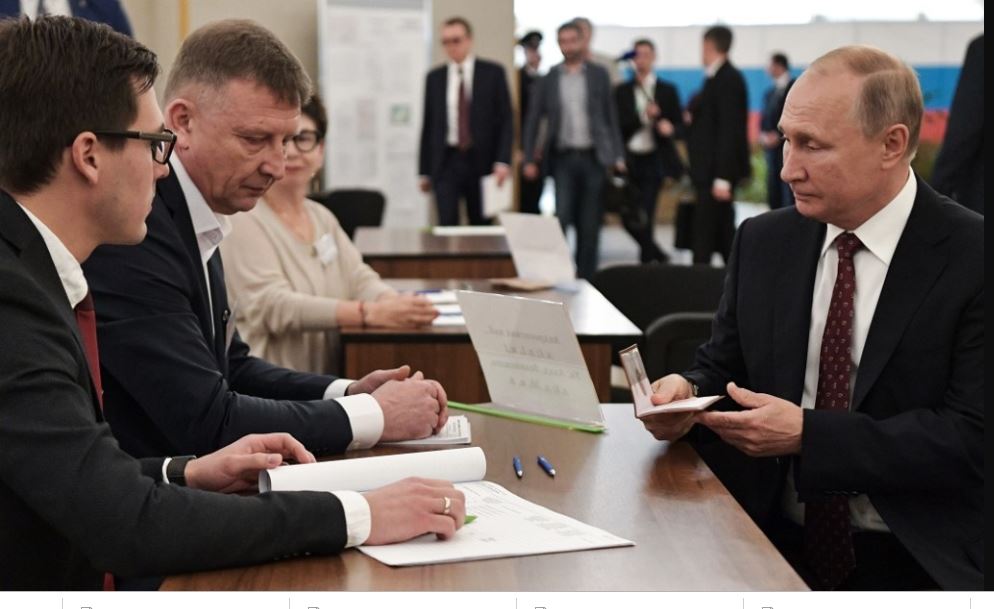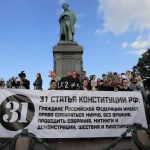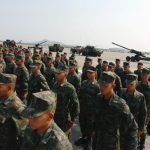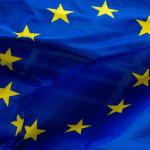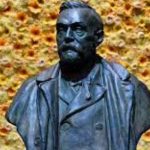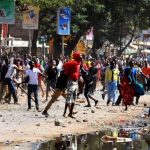Residents of Moscow voted on Sunday in one of the most closely watched local elections in years after the exclusion of many opposition candidates triggered the biggest protests in the Russian capital for nearly a decade.
Protests erupted in mid-July after the Central Election Commission refused to register a large numbers of opposition-minded candidates, saying they had failed to collect enough signatures from genuine backers – a response that President Vladimir Putin endorsed on Sunday after casting his ballot.
Those excluded, including allies of prominent opposition politician Alexei Navalny, denounced the move as a ruse designed to stop them winning seats in Moscow’s parliament.
Local or regional elections took place across all of Russia’s 11 time zones on Sunday. But the main focus was on Moscow after this summer’s demonstrations there turned into the biggest sustained protest movement in Russia since 2011-2013.
Residents of Moscow voted on Sunday in one of the most closely watched local elections in years after the exclusion of many opposition candidates triggered the biggest protests in the Russian capital for nearly a decade.
Protests erupted in mid-July after the Central Election Commission refused to register a large numbers of opposition-minded candidates, saying they had failed to collect enough signatures from genuine backers – a response that President Vladimir Putin endorsed on Sunday after casting his ballot.
Those excluded, including allies of prominent opposition politician Alexei Navalny, denounced the move as a ruse designed to stop them winning seats in Moscow’s parliament.
Local or regional elections took place across all of Russia’s 11 time zones on Sunday. But the main focus was on Moscow after this summer’s demonstrations there turned into the biggest sustained protest movement in Russia since 2011-2013.
Residents of Moscow voted on Sunday in one of the most closely watched local elections in years after the exclusion of many opposition candidates triggered the biggest protests in the Russian capital for nearly a decade.
Protests erupted in mid-July after the Central Election Commission refused to register a large numbers of opposition-minded candidates, saying they had failed to collect enough signatures from genuine backers – a response that President Vladimir Putin endorsed on Sunday after casting his ballot.
Those excluded, including allies of prominent opposition politician Alexei Navalny, denounced the move as a ruse designed to stop them winning seats in Moscow’s parliament.
Local or regional elections took place across all of Russia’s 11 time zones on Sunday. But the main focus was on Moscow after this summer’s demonstrations there turned into the biggest sustained protest movement in Russia since 2011-2013.
Residents of Moscow voted on Sunday in one of the most closely watched local elections in years after the exclusion of many opposition candidates triggered the biggest protests in the Russian capital for nearly a decade.
Protests erupted in mid-July after the Central Election Commission refused to register a large numbers of opposition-minded candidates, saying they had failed to collect enough signatures from genuine backers – a response that President Vladimir Putin endorsed on Sunday after casting his ballot.
Those excluded, including allies of prominent opposition politician Alexei Navalny, denounced the move as a ruse designed to stop them winning seats in Moscow’s parliament.
Local or regional elections took place across all of Russia’s 11 time zones on Sunday. But the main focus was on Moscow after this summer’s demonstrations there turned into the biggest sustained protest movement in Russia since 2011-2013.
Residents of Moscow voted on Sunday in one of the most closely watched local elections in years after the exclusion of many opposition candidates triggered the biggest protests in the Russian capital for nearly a decade.
Protests erupted in mid-July after the Central Election Commission refused to register a large numbers of opposition-minded candidates, saying they had failed to collect enough signatures from genuine backers – a response that President Vladimir Putin endorsed on Sunday after casting his ballot.
Those excluded, including allies of prominent opposition politician Alexei Navalny, denounced the move as a ruse designed to stop them winning seats in Moscow’s parliament.
Local or regional elections took place across all of Russia’s 11 time zones on Sunday. But the main focus was on Moscow after this summer’s demonstrations there turned into the biggest sustained protest movement in Russia since 2011-2013.
Residents of Moscow voted on Sunday in one of the most closely watched local elections in years after the exclusion of many opposition candidates triggered the biggest protests in the Russian capital for nearly a decade.
Protests erupted in mid-July after the Central Election Commission refused to register a large numbers of opposition-minded candidates, saying they had failed to collect enough signatures from genuine backers – a response that President Vladimir Putin endorsed on Sunday after casting his ballot.
Those excluded, including allies of prominent opposition politician Alexei Navalny, denounced the move as a ruse designed to stop them winning seats in Moscow’s parliament.
Local or regional elections took place across all of Russia’s 11 time zones on Sunday. But the main focus was on Moscow after this summer’s demonstrations there turned into the biggest sustained protest movement in Russia since 2011-2013.
Residents of Moscow voted on Sunday in one of the most closely watched local elections in years after the exclusion of many opposition candidates triggered the biggest protests in the Russian capital for nearly a decade.
Protests erupted in mid-July after the Central Election Commission refused to register a large numbers of opposition-minded candidates, saying they had failed to collect enough signatures from genuine backers – a response that President Vladimir Putin endorsed on Sunday after casting his ballot.
Those excluded, including allies of prominent opposition politician Alexei Navalny, denounced the move as a ruse designed to stop them winning seats in Moscow’s parliament.
Local or regional elections took place across all of Russia’s 11 time zones on Sunday. But the main focus was on Moscow after this summer’s demonstrations there turned into the biggest sustained protest movement in Russia since 2011-2013.
Residents of Moscow voted on Sunday in one of the most closely watched local elections in years after the exclusion of many opposition candidates triggered the biggest protests in the Russian capital for nearly a decade.
Protests erupted in mid-July after the Central Election Commission refused to register a large numbers of opposition-minded candidates, saying they had failed to collect enough signatures from genuine backers – a response that President Vladimir Putin endorsed on Sunday after casting his ballot.
Those excluded, including allies of prominent opposition politician Alexei Navalny, denounced the move as a ruse designed to stop them winning seats in Moscow’s parliament.
Local or regional elections took place across all of Russia’s 11 time zones on Sunday. But the main focus was on Moscow after this summer’s demonstrations there turned into the biggest sustained protest movement in Russia since 2011-2013.

